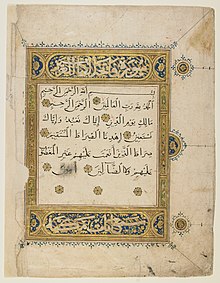Al-Fatiha
From Wikipedia, the free encyclopedia
This article is about the Surah of the Quran. For the Muslim LGBT rights organization, see Al-Fatiha Foundation.
| الفاتحة Al-Fātiḥah The Opening | |
|---|---|
| Classification | Meccan |
| Position | Juzʼ 1 |
| Number of verses | 6 (7 counting tasmee') |
| Number of words | 29 |
| Number of letters | 139 |
| Quran |
|---|
 |
Sūrat al-Fātiḥah (Arabic: سُّورَةُ الفَاتِحَة) is the first chapter (Surah) of the Quran. Its seven verses (ayat) are a prayer for the guidance, lordship and mercy of the reciter's God.[1] This chapter has an essential role in Islamic prayer (Salāt). The primary literal meaning of the expression "al-Fātiḥah" is "The Opening," which could refer to this Surah being "the opening of the Book" (Fātiḥat al-kitāb), to its being the first Surah recited in each cycle (rakʿah) of prayer, or to the manner in which it serves as an opening for many functions in everyday Islamic life. Some Muslims interpret it as a reference to an implied ability of the Surah to open a person to faith in God.[2]
Contents
[hide]Names[edit]
The name al-Fātiḥah ("the Opening") is due to the subject-matter of the Surah. Fātiḥah is that which opens a subject or a book or any other thing. In other words, a sort of preface.[1]
It is also called, Umm Al-Kitab ("the Mother of the Book") and Umm Al-Quran ("the Mother of the Quran");[3][4] Sab'a al Mathani("Seven repeated [verses]", an appellation taken from verse 15:87 of the Quran);[4] Al-Hamd ("praise"), because a hadith narratesMuhammad as having said: "The prayer [al-Fātiḥah] is divided into two halves between Me and My servants. When the servant says, 'All praise is due to God', the Lord of existence, God says, 'My servant has praised Me'.";[5] Al-Shifa' ("the Cure"), because a hadith narrates Muhammad as having said: "The Opening of the Book is a cure for every poison.";[6][7][non-primary source needed], Al-Ruqyah("remedy" or "spiritual cure").,[4] and al-Asas, "The Foundation", referring to its serving as a foundation for the entire Quran [8]
Background[edit]
According to Abd Allah ibn Abbas and others, al-Fātiḥah is a Meccan sura; while according to others it is a Medinan sura. The former view is more widely accepted, although some believe that it was revealed in both Mekka and Medina.[9][10] In the Quran, the first revelations to Muhammad were only the first few verses (ayats) of Surahs Alaq, Muzzammil, Al-Muddathir, etc. Most narrators recorded that al-Fātiḥah was the first complete Surah revealed to Muhammad.[1]
Theme and subject matter[edit]
Al-Fātiḥah is often believed to be a synthesis of the Quran.[11] It in itself is a prayer at the very beginning of the Quran, which acts as a preface of the Quran and implies that the book is for a person who is a seeker of truth—a reader who is asking a deity who is the only one worthy of all praise (and is the creator, owner, sustainer of the worlds etc.) to guide him to a straight path.[1] It can be said to "encapsulate all of the metaphysical and eschatological realities of which human beings must remain conscious." [12]
Interpretations[edit]
There are differing interpretations for verses 6 and 7. The phrase "the Path journeyed by those upon whom You showered blessings" is usually seen as referring to Muslims. The phrase "those who made themselves liable to criminal cognizance/arrest" (more clearly translated as "those who have incurred Your wrath") is usually seen as referring to the Jewsand the phrase "those who are the neglectful wanderers" (more clearly translated as "those who have gone astray") is seen as referring to the Christians.[13] The Quran: An Encyclopedia, authored by 43 Muslim and non-Muslim academics says, "The Prophet interpreted those who incurred God’s wrath as the Jews and the misguided as the Christians".[14] Other commentators suggest that these verses do not refer to any particular religious community.[13]
Related ahadith[edit]
| This article relies too much on references to primary sources. (May 2015) |
In his hadith collection Musnad Ahmad ibn Hanbal, Ahmad ibn Hanbal recorded that Abu Sa`id bin Al-Mu`alla had said:
One hadith narrates a story of a companion of Muhammad who recited al-Fātiḥah as a remedy for a tribal chief who was poisoned. According to the hadith, Muhammad later asked the companion, "How did you know that it is a Ruqyah [remedy]?"[4] Muhammad al-Bukhari recorded in his collection:
Similar versions are found in: Al-Bukhari: 007.071.645[17]—medicine; Al-Bukhari: 007.071.633[18]—medicine; Al-Bukhari: 007.071.632[19]—medicine
A similar story is found in Al-Bukhari: 001.012.723[22]—characteristics of prayer.
Muslim ibn al-Hajjaj recorded:
See also[edit]
Notes and references[edit]
- ^ a b c d Maududi, Sayyid Abul Ala. Tafhim Al Quran.
- ^ Joseph E. B. Lumbard "Commentary on Sūrat al-Fātiḥah," The Study Quran. ed. Seyyed Hossein Nasr, Caner Dagli, Maria Dakake, Joseph Lumbard, Muhammad Rustom (San Francisco: Harper One, 2015), p. 3.
- ^ Mulla Sadra. Tafsir al-Quran al-Karim. pp. 1:163–164.
- ^ a b c d Ibn Kathir. Tafsir Ibn Kathir.
- ^ Abu al-Qasim al-Khoei. Al-Bayan Fi Tafsir al-Quran. p. 446.
- ^ Muhammad Baqir Majlisi. Bihar al-Anwar. pp. 89:238.
- ^ Al-Hurr al-Aamili. Wasā'il al-Shīʿa. pp. 6:232.
- ^ Joseph E. B. Lumbard, "Introduction to Sūrat al-Fātiḥah," The Study Quran. ed. Seyyed Hossein Nasr, Caner Dagli, Maria Dakake, Joseph Lumbard, Muhammad Rustom (San Francisco: Harper One, 2015), p. 3.
- ^ Ahmad, Mirza Bahir Ud-Din (1988). The Quran with English Translation and Commentary. Islam International Publications Ltd. p. 1. ISBN 1-85372-045-3.
- ^ English Translation and Commentary 5 Volumes
- ^ Joseph E. B. Lumbard, "Introduction to "Sūrat al-Fātiḥah," The Study Quran, ed. Seyyed Hossein Nasr, Caner Dagli, Maria Dakake, Joseph E. B. Lumbard, and Muhammad Rustom (San Francisco: Harper One, 2015), p. 3.

No comments:
Post a Comment
Note: only a member of this blog may post a comment.